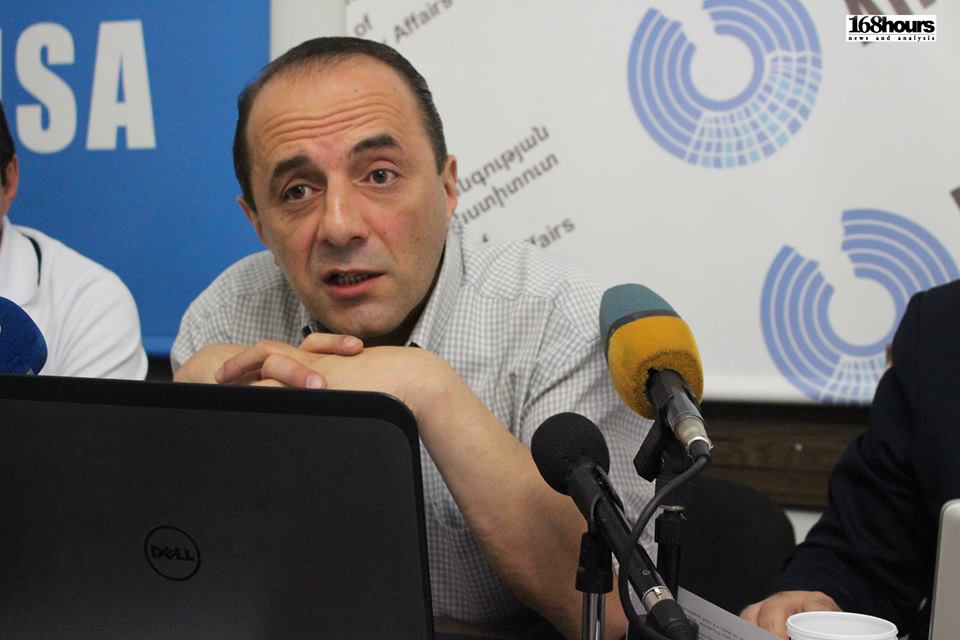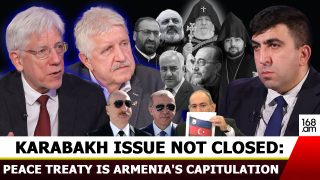
Geopolitical Storm is Occurring around Armenia, Implications of which will Be Fatal for the Many: Ruben Mehrabyan

Interview with Ruben Mehrabyan, associate fellow of the Armenian Institute of International and Security Affairs (AIISA), expert at the Center for Political and International Studies.
Mr. Mehrabyan besides domestic policy developments these days Armenia appeared in the center of rather noteworthy regional occurrences. It became known that RA president Serzh Sargsyan will pay a working visit to Russia on August 10. A few developments will be recorded prior to the visit—RF president Vladimir Putin will visit Baku for negotiations around new trilateral format with presidents of Azerbaijan and Iran, the next day Putin will receive Erdogan, and on August 10 Putin will receive Armenia’s president in a situation, when Russian plans of NK conflict settlement will be touched upon, and an active stage of Russia-Turkey rapprochement is existent. In your opinion, what should be anticipated from these meetings?
Hardly something good. A geopolitical storm is occurring around Armenia, implications of which will be fatal for the many, and its results will be shaped later. Armenia, as a result of, mildly said, inadequate policy appeared in a situation, where it deprived itself of the potential of, on the one hand, confronting challenges, and making use of the opening possibilities on the other. At this phase it’s not realistic waiting for or putting forward an issue reach some positive results. The most positive result will be the fact that we came out of this geopolitical storm without losses, refrained from regional crisis and shocks. It’s necessary to clearly imagine who are our real allies, contestants and opponents in all these, and build political steps, strategy and tactics on the ground of those reviewed imaginations.
It’ll increase our chances to solve the issue mentioned by me, i.e. avoid losses, turn challenges into possibilities and move forward. And for that, as a minimal precondition, Armenia needs considerable reserves of domestic policy strength, Armenia needs leadership gifted with public trust, state system with the abilities to make adequate decisions, which is able to pursue adequate domestic policy and as its derivative—adequate foreign policy.
On account of these regional developments, in which Azerbaijan’s role sharply increases for Russia both in the context of a trilateral format and Russia-Turkey relations, what may Russia do?
Russia has passed on to geopolitical attack and attempts to save its sinking empire, without discriminating the means. First, Moscow attempts to catch fish in troubled waters of Erdogans’ deepening contrasts with the West, encouraging Turkey in its policy. Of course, Russia-Turkey contrasts are maintained at least in the Middle East, however, in other issues, and in particular, regarding the Caucasus and Iran, Moscow and Ankara have deep similarities and shared interests. And even the factor of downed plane and by that the factor of Putin’s downed dignity didn’t change anything at large. Those neo-imperialist states, which are mirror reflections of one another nourish and supplement one another at the same time appearing in different conditions. Clashes of those interests are particularly manifested in Azerbaijan.
After being unsanctioned, Iran is vitally interested to diversify its communications leading to north and west. Moreover, Tehran strives to develop those communications in all directions separately, to exclude the possibility of any political dependency. For that purpose Iran doesn’t say “no” to anyone, and takes all the cooperation directions—to Ashgabat, Baku, Yerevan, Nakhchivan, Ankara, Erbil, Baghdad and elsewhere, without conditioning one with the other, manifesting proper “strategic patience” and also balancing one with the other. Moreover, this approach is strictly exemplary for Armenia as well.
Of course, it’s not a secret that Moscow observes Tehran as a serious competitor, not only due to immense hydrocarbon reserves, but regarding the potential to pass East-West communications. If we draw a direct line from the Barents Sea and the Caspian Sea to Persian Gulf, then East-West possible communications surpass that line either in the territory of Russia or in the territory of Iran. There is no other state on that immense territory. Within trilateral format together with Azerbaijan, Moscow strives to keep Iran’s communications to the West under control, attempting to “own” them in its territory, after which making them another component of Russia-West political trade.
It’s also clear that Moscow’s participation in Baku-Tehran relations is directed to it, so that those communications from Azerbaijan were in no case directed to Georgia. Baku “will be allowed” local, non-strategic volume freight transportations to Georgia and Turkey, and Ankara will be satisfied with the point that Iran won’t strengthen to a degree to turn into its serious geopolitical contestant in all directions. Accordingly, at this “set” Moscow will strive with all its leverages, in particular, through its monopolistic positions of “Gazprom,” “Rosneft” and “Russian railways” keep “frozen,” out of game to exclude development of Armenia-Georgia communication corridor, which will connect Persian Gulf with the Black Sea, which, basically, it performed successfully and performs under the conditions of Yerevan’s utter permissiveness.
The possibility is great, that Moscow will attempt Armenia-Turkey “football diplomacy”-2, out of Karabakh conflict Minsk Group, as initiating new “settlement” processes. Of course, those attempts will not only fail, but will essentially worsen Armenia’s positions taking from Armenia both resources and time…
And generally, in this game Moscow’s “train of thought” is perfectly perceived in Tehran and Tbilisi, and Yerevan doomed itself to inactivity and almost does nothing to take off Russian circle from its neck. It was only last week that RA Government finally established a CJSC to cover Iran-Armenia pipeline issues. Armenia should also engage strategic investor to transit communications connecting Iran to Georgia’s Black Sea ports through our territory. This has vital, strategic importance for our, and why not, for Georgia’s future. Is nowadays and such Armenia ready for this? Of course-not.
For that different quality and mentality authorities are needed with different strength reserves, showing political will, principally saying “no” to Russia, led with Armenia’s national interest, tended to the future, opinionated and zealous authorities.
We have no time, countdown has started. These historical possibilities will more and more decrease and escape like sand through fingers.
Armenia will still longer have issues and a closed border with its eastern and western neighbors, thus, the politics is simply contraindicated to us, which will suppress or destroy complex development of our relations with northern and southern neighbors, i.e. Iran and Georgia. Prevention in relations with the first are Russian monopolies, and with the second Armenia’s “lovely” obligations, within the so-called CSTO and EEU, which, in fact, turns Armenia-Georgia border into a dividing line.
These issues also oblige us to change our reality regarding both internal and external relations, review and re-assess our challenges, ways of overcoming them, our security challenges, recalculate who are our possible and real allies, contestants and opponents.
By Araks Martirosyan























